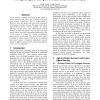Free Online Productivity Tools
i2Speak
i2Symbol
i2OCR
iTex2Img
iWeb2Print
iWeb2Shot
i2Type
iPdf2Split
iPdf2Merge
i2Bopomofo
i2Arabic
i2Style
i2Image
i2PDF
iLatex2Rtf
Sci2ools
120
click to vote
ICDCSW
2003
IEEE
2003
IEEE
Privilege Delegation and Agent-Oriented Access Control in Naplet
Access control in existing Java-based mobile agents is mostly based on code source due to limitations of early Java security architecture. That is, authorization is based on where the agent code comes from, regardless of the subject of code execution. This paper presents an agent-oriented access control strategy, by taking advantage of the latest Java subject-based security features. It allows the agents to exercise their privileges based on their own roles in distributed applications. The access control is realized by a group of additional agent-oriented permissions. They grant access control privileges to system resources and services in a flexible and secure manner. Permission implications between agents of different clone generations and from different owners are also supported.
Access Control | Agent-oriented Access Control | Distributed And Parallel Computing | ICDCSW 2003 | Java-based Mobile Agents |
Related Content
| Added | 04 Jul 2010 |
| Updated | 04 Jul 2010 |
| Type | Conference |
| Year | 2003 |
| Where | ICDCSW |
| Authors | Cheng-Zhong Xu, Song Fu |
Comments (0)

